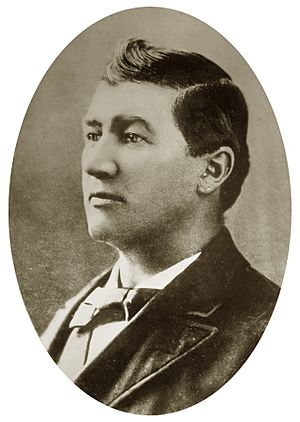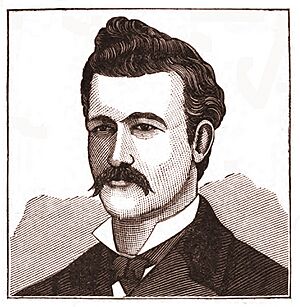Denis Kearney facts for kids
Quick facts for kids
Denis Kearney
|
|
|---|---|
 |
|
| Born | 1846 or 1847 or 1848 Oakmount, County Cork, Ireland
|
| Died | 1907 |
| Nationality | Irish |
| Occupation | Drayman and labor organizer |
| Spouse(s) | Mary Ann Leary |
Denis Kearney (1847–1907) was an Irish immigrant who became a well-known labor leader in California during the late 1800s. He was famous for his strong and often harsh speeches. These speeches usually focused on four main things: his dislike for newspapers, for wealthy business owners (called capitalists), for politicians, and especially for Chinese immigrants.
Kearney was a key leader of the Workingmen's Party of California, a group that aimed to help working people. He was known for ending all his speeches with a very famous phrase: "And whatever happens, the Chinese must go." This was similar to an ancient Roman senator who always ended his speeches by saying that Carthage (a rival city) must be destroyed.
Denis Kearney was part of a movement that tried to give more power to the working class. However, over time, his words became very angry and extreme. He was arrested many times for encouraging violence, which made many people who supported him start to turn away. When the economy got better in the early 1880s, Kearney became less important in public life. He then started a business that helped people find jobs and worked there until his health declined around 1900. He passed away in Alameda, California, in 1907.
Contents
Denis Kearney's Life Story
His Early Years and Family
Denis Kearney was born in Oakmount, County Cork, Ireland. Records show his birth year as either 1846, 1847, or 1848. He was the second of seven sons. When he was just 11 years old, his father died, and Denis left home. He became a cabin boy on a fast sailing ship called the Shooting Star. He later said he traveled "around the world."
In 1868, he arrived in the United States. He married an Irish woman named Mary Ann Leary. Their daughter, Maggie, was born in 1871. Two years later, in 1873, Denis and his family moved to San Francisco. There, he became a U.S. citizen and started his own drayage business. This meant he used wagons to haul goods around the city. His son, William, was born in 1873, and another daughter, Amelia, was born in 1875. By 1877, his business was doing very well. He owned five wagons and moved goods all over San Francisco.
Becoming a Public Speaker
In 1877, Kearney became involved in public life. He spoke out against a city rule that gave one company control over all the hauling jobs. To fight this, he helped start a group for workers. This group soon became the Workingmen's Party of California. For several years, this party gave Kearney a place to speak to large crowds of people who were out of work in San Francisco.
At first, his speeches focused on bringing together poor and working-class people. He attacked the greed of big businesses, especially the railroads. He saw himself as a "workingman's advocate," meaning someone who spoke up for workers. However, he often criticized labor unions and strikes throughout his life.
Many people criticized Kearney because he was an Irish immigrant. Some thought he was causing trouble. Middle-class critics worried about his strong words. They questioned if Irish immigrants, like Kearney, should have the right to decide social rules in San Francisco.
A Powerful Speaker for Workers
Despite the criticism, Kearney's popularity grew. He often spoke at a place near San Francisco City Hall called "The Sandlot." Crowds of up to 2,000 people would gather to hear him. People said he had a natural talent for exciting a crowd. His speeches often lasted two hours, giving him plenty of time to stir up his audience.
One of his famous actions was to slowly raise his voice until it was very loud. Then, he would dramatically take off his coat and unbutton his collar. These actions always made the crowd cheer loudly.
Kearney never went to school, but he loved to read and debate. He went to a club in San Francisco called the Lyceum of Self-Culture. Here, he practiced his speaking skills at weekly meetings. Someone who knew him said he was "moderate in everything but speech." He spoke forcefully, and when he wanted to make a point, his words were like "missiles." The Boston Globe newspaper said that "Mr. Kearney has power, and his power is that of the kind which to be appreciated must be seen and heard."
In some of his speeches, Kearney strongly encouraged people to take action against politicians and leaders. He often urged people to get revenge on politicians who broke their promises. He would say things like, "If the Workingmen's Party must win, it will, even if it means fighting hard."
Kearney was arrested several times for encouraging violence. But he was always released because the charges were dropped or no one would speak against him. His arrests actually made him more popular and brought more members to the Workingmen's Party.
Speaking Against Chinese Immigration
In one of his early speeches, Kearney actually told workers to be "thrifty and industrious like the Chinese." But within a year, he started blaming Chinese immigrants for the money problems of white workers. By 1878, he used his speeches at the Sandlot to speak often and harshly against Chinese immigrants. He claimed they caused many problems. He warned railroad owners that they had three months to fire all their Chinese workers. If they didn't, he suggested people might take justice into their own hands.
Soon, he became known throughout California for his speeches that were full of racial prejudice. He kept repeating his famous slogan: "The Chinese must go."
In 1878, Kearney traveled to Boston to share his message against the Chinese with people in the eastern United States. He was welcomed warmly at first. Thousands of people came to hear his first speech in Faneuil Hall on August 5. Many more couldn't even get in. However, after a short time, fewer people came to his speeches. The Boston Journal newspaper noted that "the workingmen of this state are by no means united in welcoming Kearney." Many workers disagreed with his anti-Chinese ideas. They also disliked his strong and intolerant views.
While in Massachusetts, he campaigned with Benjamin Butler, a politician running for President. Kearney hoped to become the Vice Presidential candidate, but Butler never offered him the spot. As newspapers in the East began to criticize him more, he returned to San Francisco.
Kearney sometimes argued with Wong Chin Foo, a Chinese-American civil rights activist. In 1883, Wong challenged Kearney to a duel in New York. Wong offered Kearney a choice of weapons, including "chopsticks, Irish potatoes, or Krupp guns." Kearney responded by calling Wong names. Wong later wrote about Kearney in a sarcastic way, suggesting that even if Kearney went to heaven, he might try to kick out others like Wong.
His Later Life
By the early 1880s, Kearney became less active in public life. His main impact was the anti-Chinese laws that the Workingmen's Party helped pass at the 1879 California Constitutional Convention. However, many of these laws, like banning Chinese laborers from working, were later found to be against the U.S. Constitution by the federal Ninth Circuit Court.
In the late 1880s, Kearney wrote to the Irish author and politician James Bryce, 1st Viscount Bryce. Kearney still claimed that he had made the "Chinese Question" a national issue. He believed he influenced the creation of the Chinese Exclusion Act in 1882, which greatly limited Chinese immigration to the U.S.
Today, there is a Kearny Street in San Francisco that goes through Chinatown. However, this street was not named after Denis Kearney. It was named after Stephen W. Kearny, an Army officer from the Mexican–American War.
Famous Quotes from Kearney's Speeches
- "When the Chinese problem is solved, we can talk about what to do with the wealthy business owners. In six months, we will have 50,000 men ready to act... and if 'John' [the Chinese] doesn't leave, we will force him into the sea... We are ready to do it... If voting doesn't work, we are ready to use force."
- "When I have fully organized my party, we will march through the city and make the dishonest people give back what they stole. I will lead you to the City Hall, remove the police, punish the lawyers, destroy every law book, and then create new laws for the workingmen."
- "For newspaper reporters, I have great respect. The reporters are workingmen, just like us, working for a living. But for the evil, snake-like, horrible people who run the newspapers, I have the greatest dislike."
- "If the lawmakers go too far, then ropes are the answer." (This referred to ropes used for hangings.)
In Popular Culture
- The character Dylan Leary in the TV series Warrior is based on Denis Kearney. He is played by Dean Jagger.
Works
- The Workingmen's Party of California: An Epitome of Its Rise and Progress. San Francisco: Bacon, 1878.
 | John T. Biggers |
 | Thomas Blackshear |
 | Mark Bradford |
 | Beverly Buchanan |


